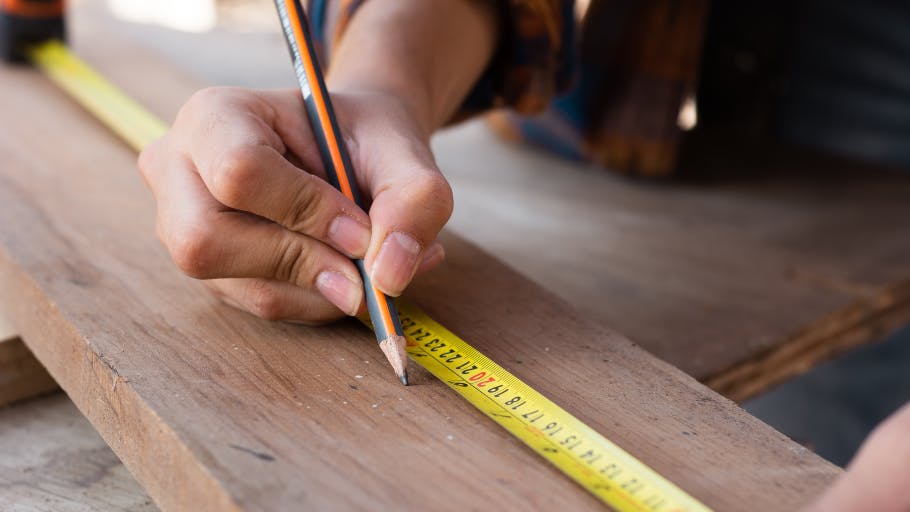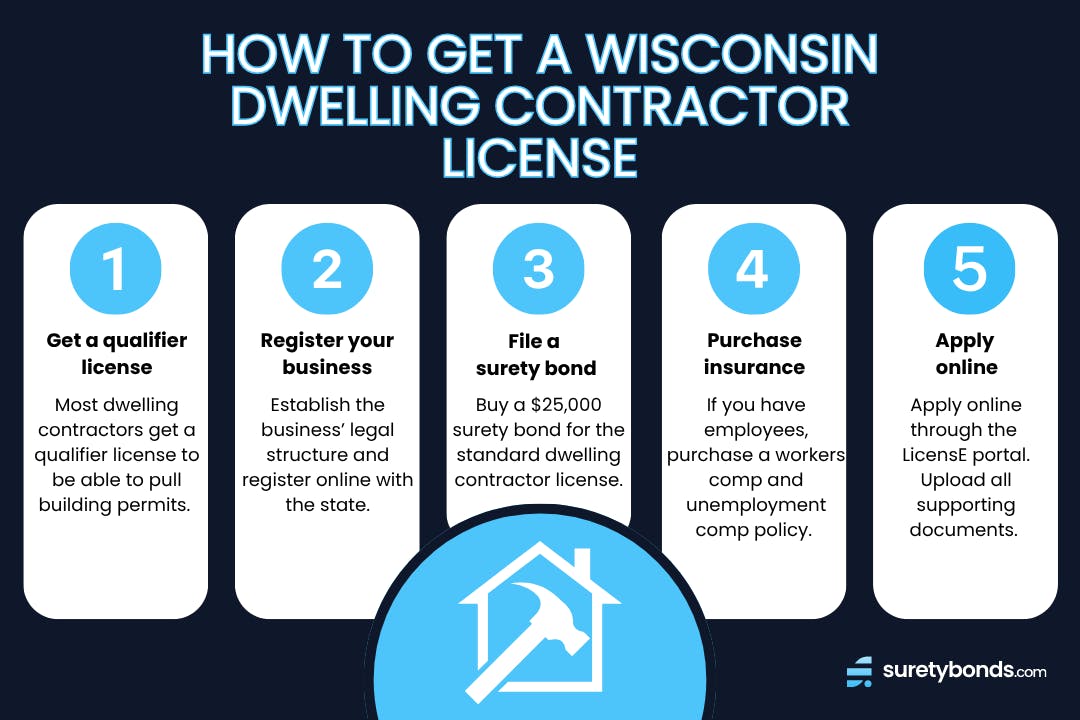
How to Become a Dwelling Contractor in Wisconsin
This guide is for informational purposes only. SuretyBonds.com does not regulate or manage dwelling contractor licenses in Wisconsin. Contact the Department of Safety and Professional Services for the latest official requirements.
How to Become a Dwelling Contractor in Wisconsin
In Wisconsin, there is no specific general contractor license. Instead, most residential construction work falls under the dwelling contractor license.
If you're performing construction work on one- or two-story houses, you will need to be licensed with the Wisconsin Department of Safety and Professional Services (DSPS).
Your license type will depend on the volume of your work and whether you need building permits. Continue reading for a breakdown of the different licensing levels, step-by-step application instructions and renewal information.

What Type of Dwelling Contractor License Do I Need?
The DSPS offers three different types of dwelling contractor licenses: the qualifier certification, regular, and restricted. You may need multiple depending on the nature of your work.
Dwelling Contractor Qualifier Certification
The dwelling contractor qualifier certification, also known as the qualifier license, is an individual credential required before you can apply for any other license. Many contractors hold both the qualifier and a regular or restricted license.
Under this license, you can work for a licensed contracting business, but you cannot contract your work independently under your name. It allows you to pull permits for one- or two-family dwellings only on behalf of a licensed company.
Requirements: You must complete 12 hours of continuing education every 2 years to maintain certification. No surety bond required.
Dwelling Contractor License
The standard dwelling contractor license is a business certification that allows you to perform all types of residential work, including new construction, additions and remodels.
With this license, you can operate as an independent contractor and sign contracts in your name. However, you or one of your employees must hold the qualifier certification to pull building permits.
Requirements: You must prove financial security through either a $25,000 surety bond or liability insurance to remain licensed.
Dwelling Contractor Restricted License
The dwelling contractor restricted license allows you to perform the same contracting work as the regular license. You still need the qualifier to pull permits.
With this license, you can perform all types of residential dwelling work, but the individual project value cannot exceed $25,000 or more.
Requirements: You must hold a surety bond in the amount of the work you expect to complete.
How Do I Get a Dwelling Contractor License in Wisconsin?
To get a standard or restricted dwelling contractor license in Wisconsin, follow these five steps.

Step 1: Get a qualifier license
While not mandatory to apply for the standard license, most dwelling contractors start by getting a qualifier license. This will allow you to pull building permits.
You must complete at least 12 hours of approved training before applying. Select an initial qualifier course from the DSPS’s approved course list.
Once completed, apply online through LicensE and pay the registration fee.
Step 2: Register your business
Next, establish your contracting business’ legal structure. All businesses must register with the state online, even if you’re self-employed.
Step 3: Purchase a surety bond
You’ll need a $25,000 surety bond for the standard dwelling contractor license. For a restricted license, your bond must equal the amount of work you expect to complete.
Purchase your Wisconsin dwelling contractor bond online in minutes from SuretyBonds.com. Premiums cost $100–$125, depending on your bond amount.
Note: For regular licenses, you can instead submit liability insurance with $250,000 coverage per occurrence. However, a surety bond is typically the most affordable and efficient option.
Step 4: Purchase insurance
If your contracting business has employees, you also must purchase a workers’ compensation insurance policy and an unemployment compensation policy.
Step 5: Apply online
Apply online through LicensE for either the restricted or regular license. Upload all supporting documents.
Your license status will be updated through the online system.
How to Renew Your Dwelling Contractor License
All licenses expire on the date of issuance. The dwelling contractor qualifier license expires every two years, while the regular and restricted licenses expire annually.
Complete the renewal application on your LicensE account. Upload proof of an up-to-date surety bond and insurance policies, if applicable.
Since the qualifier license requires continuing education, your provider must put your course hours into LicensE before you can start the renewal application.
The renewal fee depends on your license classification:
- Qualifier: $30
- Regular: $25
- Restricted: $25
How Much Does It Cost to Get a Dwelling Contractor License?
The total cost to get a Wisconsin dwelling contractor license includes the following fees:
- Training course: Typically $100–$150, provider pricing varies
- Licensing fee: Typically $40–$50 (calculated in the online portal)
- Surety bond: $100–$125 per year*
- Unemployment and workers’ comp insurance: Policy prices vary
*SuretyBonds.com dwelling contractor bonds cost $125 for one year of $25,000 coverage. For any amount, select a multi-year term at checkout to save 25% per year.
Can I Work With Lead-Based Paint?
Yes, dwelling contractors can work with lead-based paint, but you must complete an approved training course.
The DSPS requires certification if you perform regulated lead-based paint activities in housing built before 1978 or in child-occupied facilities. This includes the following activities:
- Reducing harmful lead (abatement)
- Lead testing, inspection, and risk assessment
- Most renovations that disturb paint
- Post-renovation and post-abatement clearance, including dust testing
Do I Need a License to Be a Handyman in Wisconsin?
Yes, most handyman work requires a qualifier license. Without one, you can only do minor repairs that don’t impact a property’s structural integrity. This includes small jobs like fixing leaky faucets, painting and replacing light fixtures.
You must have a dwelling contractor qualifier license to complete projects valued at over $1,000 or that require permits. You also need a regular or restricted license to perform contract work.
Last Updated: October 28, 2025
